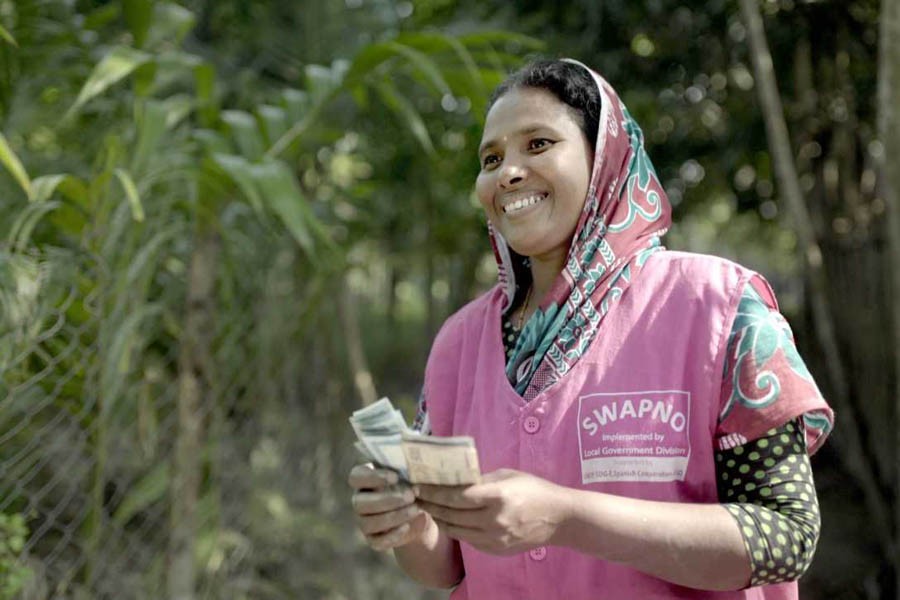
Published :
Updated :

Bangladesh has made significant progress in financial inclusion over the past eight years, with as much as 48 per cent of the adult population now under the banking umbrella. In 2013, only 20 per cent of Bangladesh's adult population was under the umbrella of formal financial services.
Financial inclusion or inclusive financing is the delivery of financial services at affordable costs to sections of disadvantaged and low-income segments of society, in contrast to financial exclusion where those services are not available or affordable.
Mobile financial services (MFS) played a big role in the financial inclusion process. About Tk 10 billion is transacted daily through this platform on an average, a figure that surprises many bankers.
After MFS, the activities of agent banking came to limelight, which further propelled the process of financial inclusion. Agent banking refers to providing limited scale banking and financial services to the under-served population through agents rather than tellers or cashiers.
Rural people can make deposits and borrow from the agents, a move that has expanded the banking services widely across the country. In fact, the central bank's nod to MFS and agent banking has remarkably changed the scenario of financial inclusion process in Bangladesh.
In addition, the Bangladesh Bank has taken a number of moves, such as refinancing scheme for women and small and medium enterprise (SME) entrepreneurs and green funds for equitable and sustainable economic growth.
Yet, there are many things to do as a large number of the people still remains out of any formal financial services. Rural market and people are still outside major banking services.
Financial inclusion can be done in two ways -- opening of rural bank branches and the use of financial technologies. However, there is another way to deepen financial inclusion: agriculture financing through non-government organisations (NGOs) which are widely present throughout the country.
The central bank can also relax its policies on agent banking to encourage more banks to launch the service. According to financial analysts, Bangladesh is on the right track towards financial inclusion and the next two to three years are likely to bring many new innovations.
Although MFS and agent banking have built a strong financial connectivity, a small wrong move can derail such services from their benefits. For example, if the telecom regulator increases the charge for the Unstructured Supplementary Service Data that allows banking services from one's basic feature phone without the need for internet connection, it would cause a dent to the financial inclusion drive.
The Bangladesh Telecommunication Regulatory Commission (BTRC) has recently proposed a charge of Tk 0.85 for a 90-second session, which will include the cost for two text messages, from existing Tk 0.2. If the new pricing is introduced, it might keep away a large number of customers from the MFS platform.
Dutch Queen Maxima, during her visit to Bangladesh some time ago, said the country has made a commendable progress in accelerating financial inclusion. But it has a lot more to do to bring the unbanked poor under financial services, she said. The Dutch Queen came here in her capacity as the UN secretary-general's special advocate for inclusive finance for development.
A lot of people in Bangladesh still do not have bank accounts or digital accounts to send money to their relatives safely. The queen said bank branches in rural areas can be very expensive but the digital finance system still has a lot of growth potential.
According to a recent study, Bangladesh stood second among South Asian nations in ensuring access to financial services for its citizens, Around 66 per cent of the households in Bangladesh now have access to services including credit, savings and insurance from banks or microfinance institutions (MFIs) and cooperatives.
The country comes second only to Sri Lanka, where 80.4 per cent of the population is covered by affordable financial services. In contrast, only 48 per cent of the households in India have access to such services and 60 per cent in Pakistan. Financial inclusion has occurred in a big way in Bangladesh thanks to the MFIs, which are contributing greatly to resource mobilisation.


 For all latest news, follow The Financial Express Google News channel.
For all latest news, follow The Financial Express Google News channel.